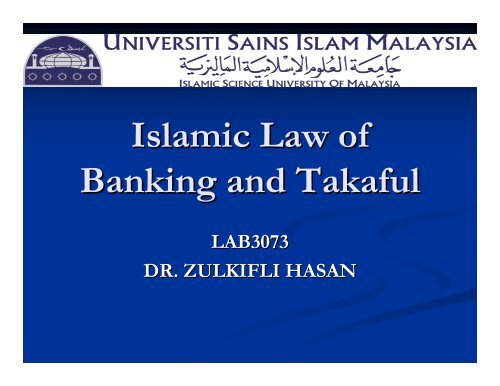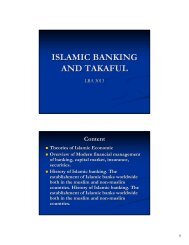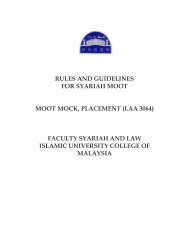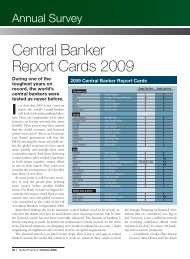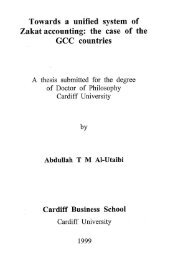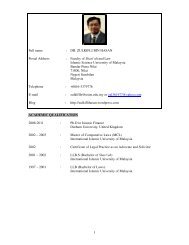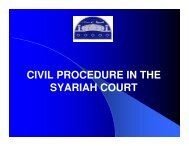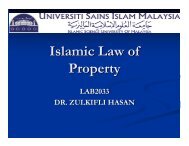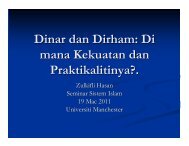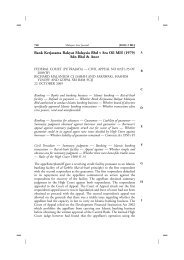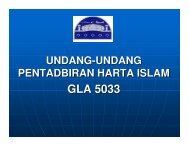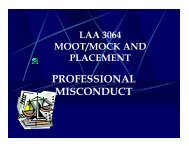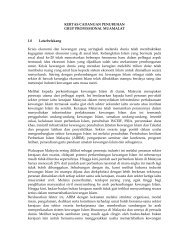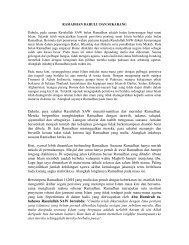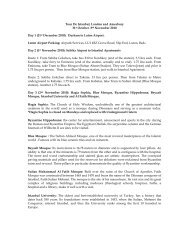Islamic Finance Cases
Islamic Finance Cases
Islamic Finance Cases
Create successful ePaper yourself
Turn your PDF publications into a flip-book with our unique Google optimized e-Paper software.
<strong>Islamic</strong> Law of<br />
Banking and Takaful<br />
LAB3073<br />
DR. ZULKIFLI HASAN
Contents<br />
<strong>Islamic</strong> finance cases<br />
1987-2002<br />
2003-2007<br />
2007<br />
2008-2011<br />
2011
1987-2002<br />
<br />
<br />
<br />
<br />
<br />
Tinta Press Sdn Berhad v BIMB (1987) 1 MLJ 474; 1<br />
CLJ 474: IJarah<br />
Bank Islam Malaysia Berhad v Adnan Omar [1994] 3 CLJ<br />
735; [1994]3 AMR 44; [1994] 4 BLJ 372: BBA<br />
Dato’ Nik Mahmud Bin Daud v Bank Islam Malaysia<br />
Berhad [1996]4 MLJ 295 (BBA) Malay Reserve<br />
Bank Islam Malaysia Bhd v Shamsuddin Bin Haji Ahmad<br />
[1999] 1 LNS 275; [1999] MLJ 450 (BBA)<br />
Bank Kerjasama Rakyat Malaysia Bhd v Nesaretnam<br />
Samyveloo [2002] 8 CLJ 95; [2002] 7 MLJ 103 (BBA)
Observation<br />
The judges are more concerned on the application of<br />
classic common law approach by emphasizing the civil<br />
technical aspects and did not tackle the actual Shari’ah<br />
ah<br />
issues.<br />
In the case of Bank Islam Malaysia Berhad v Adnan Omar,<br />
the High Court held that the defendant was bound to<br />
pay the whole amount of the selling price based on the<br />
grounds that he knew the terms of the contract and<br />
knowingly entered into the agreement. In this respect,<br />
the court applied the classic common law<br />
interpretational approach where the parties are bound<br />
with the terms and conditions of the contract. The<br />
court did not look into the issue further whether BBA<br />
facility involves an element not approved by the<br />
Shari’ah<br />
ah as stipulated under the IBA and the BAFIA.
2003-2007<br />
2007<br />
Bank Kerjasama Rakyat Malaysia Berhad v Emcee Corporation<br />
Sdn. Bhd. [2003] 2 MLJ 408; 1 CLJ 625 (BBA)<br />
Bank Islam Malaysia Berhad v Pasaraya Peladang Sdn Berhad<br />
[2004] 7 MLJ 355 (BBA)<br />
Tahan Steel Corporation Sdn Bhd v Bank Islam Malaysia<br />
Berhad [2004] 6 CLJ 25; [2004] 6 MLJ 1 (istisna(<br />
istisna)<br />
Arab Malaysian Merchant Bank Berhad v Silver Concept Sdn<br />
Bhd [2005] 5 MLJ 210 (BBA)<br />
Malayan Banking Berhad v Marilyn Ho Siok Lin [2006] 7<br />
MLJ 249; 3 CLJ 796 (bba(<br />
bba)<br />
Affin Bank Berhad v Zulkifli Abdullah [2006] 3 MLJ 67<br />
(bba)<br />
Malayan Banking Berhad v Yakup bin Oje & Anor [2007] 6<br />
MLJ 398 (bba)
Arab Malaysian Merchant Bank v Silver Concept<br />
[2006] 8 CLJ 9<br />
<br />
<br />
<br />
Suriyadi Halim Omar J.–<br />
With the above mind-boggling minefield awaiting lawyers and<br />
judges alike it is small wonder that the Syariah Advisory Body<br />
has been mandated to be formulated.<br />
It is when rulings are required that the latter body must give its<br />
opinion. Under the above new s 16B of Act A1213, the Syariah<br />
Advisory Body appears to have a rather wide scope or referral,<br />
and not merely confined to the issue of whether the matter at<br />
hand involves any element which is not approved by the religion<br />
of Islam. Needless to say the final say must rest with the<br />
presiding judge (see s 16B(9)(a)).
Arab Malaysian Merchant Bank v Silver Concept<br />
(2008) 6 MLJ 295<br />
<br />
<br />
<br />
<br />
Wahab Patail J.:<br />
It was submitted for the plaintiff that the SAC had determined<br />
that the BBA complied with the Shariah and once the<br />
determination is made on the issue of Shariah compliance by the<br />
said SAC any question on their said determination can be<br />
referred to the SAC.<br />
Section 16B of the CBA 1958 however does not make reference<br />
mandatory. It clearly did not intend the SAC in the executive<br />
branch of government to be the judicial authority. Thus, its<br />
rulings are binding onlyupon the arbitrator where reference is<br />
made by an arbitrator.<br />
In the case of reference by the court, the ruling is not binding<br />
but shall be taken into consideration. Given that reference is<br />
discretionary and the rulings are not binding, and taking into<br />
consideration the issue is not as to the Shariah compliance of the<br />
ABBA facility but the interpretation of its terms, the court is of<br />
the opinion reference is not necessary.
Affin Bank Berhad v Zulkifly<br />
Abdullah [2006] 1 CLJ 438<br />
Wahab Patail J.–<br />
Since the question before the court is the interpretation<br />
and application of the terms of the contractual<br />
documents between the parties and of the decisions of<br />
the courts, reference of this case to another forum for a<br />
decision would be an indefensible abdication by this<br />
court of its function and duty to apply established<br />
principles to the question before it.<br />
It is not a question of Syariah law. It is the conclusion<br />
of this court, therefore, that there is no necessity to<br />
refer the question to another forum.
Observation<br />
In the second phase, the court indicates its<br />
interest to examine critically the underlying<br />
principles and financing facility offered by the<br />
IFIs. Unlike the earlier cases in the first phase,<br />
several judges initiated a different approach in<br />
resolving issues involving <strong>Islamic</strong> finance<br />
particularly in the case of Affin Bank Berhad v<br />
Zulkifli Abdullah and Malayan Banking Berhad v<br />
Marilyn Ho Siok Lin.<br />
This position indicates the improvement of<br />
judges’ level of awareness and understanding of<br />
<strong>Islamic</strong> finance.
Affin Bank v zulkifli Abdullah<br />
BBA 25 years PP: rm394k paid rm33k claimed by the<br />
B: rm958k<br />
Held: profit up to the date of judgment plus penalty.<br />
The learned judge indirectly criticized the attitude of<br />
early court by using narrow interpretation and heavily<br />
applying classic common law approach.<br />
The proper approach is that for the court to examine<br />
further as to the implementation of <strong>Islamic</strong> banking<br />
whether it is contrary to the religion of Islam. The<br />
courts held that <strong>Islamic</strong> contract of BBA is similar with<br />
conventional loan and hence the <strong>Islamic</strong> banks could<br />
not claim the unearned profit because it is equal with<br />
interest calculation
2008-2011<br />
2011<br />
Bank Kerjasama Rakyat Malaysia Bhd v PSC Naval<br />
Dockyard Sdn Bhd [2008] 1 CLJ 784; [2007] MLJ 722<br />
(Bai<br />
INah)<br />
Arab Malaysian <strong>Finance</strong> Bhd v Taman Ihsan Jaya Sdn Bhd<br />
& Ors (Koperasi(<br />
Seri Kota Bukit Cheraka Bhd, , third party)<br />
[2008] 5 MLJ 631; [2009] 1 CLJ 419 (BBA)<br />
Light Style Sdn Bhd v KFH Ijarah House (Malaysia) Sdn<br />
Bhd [2009] CLJ 370; [2009] 1 LNS 193 (Murabahah(<br />
Murabahah)’]<br />
Bank Islam Malaysia Bhd v Lim Kok Hoe & Anor And<br />
Other Appeals [2009] 6 CLJ 22; [2009] 6 MLJ 839<br />
(BBA)<br />
Tan Sri Khalid Ibrahim v Bank Islam Malaysia Berhad<br />
[2009] 6 MLJ 416 (bba)<br />
Bank Islam Malaysia Bhd v Azhar Osman & Other <strong>Cases</strong><br />
[2010] 5 CLJ 54 [2010] 1 LNS 251 (bba(<br />
bba)
Observation<br />
In the case of Arab Malaysian <strong>Finance</strong> Bhd v<br />
Taman Ihsan Jaya Sdn Bhd & Ors that the<br />
application of the BBA is contrary to the IBA<br />
and the BAFIA.<br />
Clearly indicates the new constructive approach<br />
of the court towards <strong>Islamic</strong> banking cases<br />
particularly in resolving issues pertaining to BBA<br />
facility. This judgment may affect the <strong>Islamic</strong><br />
financial sector in Malaysia as the expert<br />
estimates that 70 per cent of <strong>Islamic</strong> financing<br />
facility was granted under BBA facility.
Arab Malaysian <strong>Finance</strong> Bhd v<br />
Taman Ihsan Jaya Sdn Bhd & Ors<br />
The beginning of pro-active attitude of the court<br />
in examining the validity and determining issues<br />
involved in <strong>Islamic</strong> banking cases.<br />
The Federal Constitution, the IBA and the<br />
BAFIA do not provide the interpretation of<br />
which madhhab is to prevail. BBA facility must<br />
not contain any element which is not approved<br />
by the religion of Islam under the interpretation<br />
of any of the recognized maddhab.
The court accepts that BBA facility is a bona fide sale<br />
transaction and the interpretation of selling price in the<br />
case of Affin Bank Berhad v Zulkifli Abdullah was referred<br />
to where the court rejects the plaintiffs’ interpretation<br />
and applies the equitable interpretation.<br />
Where the bank recalls BBA facility at a higher price in<br />
total, the sale is not a bona fide sale but a financing<br />
transaction and rendered the facility contrary to the IBA<br />
and the BAFIA.<br />
The court holds that the plaintiffs are entitled under<br />
section 66 of the Contracts Act 1950 to return the<br />
original facility amount they had extended. It is equitable<br />
that the plaintiffs must seek to obtain price as close to<br />
the market price as possible and account for the<br />
proceeds to the respective defendants.
Case analysis<br />
In BBA facility, the court uses an equitable interpretation<br />
as to the definition of selling price whether the defendant<br />
was bound to pay the whole amount of the selling price<br />
even in the event of early termination of the contract.<br />
The classic common law approach will require the<br />
defendants to pay the whole amount of the selling price as<br />
they are bound by the terms of the contract but the court<br />
in this case chooses to apply an equitable principle.<br />
An equitable interpretation of the selling price removes<br />
the excessive amount of profit derived from BBA<br />
transaction and therefore the defendants will only have to<br />
pay the principal sum of the facility.
Profit portion of BBA facility is unlawful and<br />
contrary to the religion of Islam<br />
1. The court considers deferred payment of the<br />
selling price is a credit or a loan and any profit<br />
claimed or charged by the bank as an additional<br />
to the facility amount is interest. The court<br />
signifies that the profit derived from BBA<br />
facility is lawful if the transaction is considered<br />
as a bona fide sale. Nevertheless, BBA facility in<br />
this case abandon the element of bona fide sale<br />
in which making the profit derived from it<br />
would be prohibited as riba
2. In addition, the court also mentions that<br />
excessive selling price under BBA facility<br />
imposed a heavier burden upon the defendants<br />
that would be contrary to the intent and purpose<br />
of verses 275-280 280 of surah al-Baqarah<br />
Baqarah. . Al-Ghazali<br />
insists the practice of ihsan or doing good deeds<br />
in business rather than merely advocating the<br />
maximization of profit. The element of<br />
tolerance and benevolence should be the basis<br />
upon which the <strong>Islamic</strong> banking business<br />
transactions are conducted.
3. the issue of iwad in BBA transaction.<br />
Although the court in the current case does not<br />
mention anywhere this specific issue, it is<br />
observed that BBA facility has apparently<br />
neglected the requirement of iwad (equal counter<br />
value or compensation) where the obligation of<br />
warranty to the properties sold has been shifted<br />
to the vendor and not the plaintiffs as the<br />
sellers. Moreover, it is evident in most of BBA<br />
legal documentations that the bank holds no<br />
liability arising from all defective assets sold.
4. The true nature of contracts and transactions is<br />
the substance and not the words and the<br />
structure. The distinction between a sale and a<br />
loan is not maintained in its form alone but it<br />
must also be maintained in substance.<br />
The court opines that BBA facility may be<br />
classified as pretence of sale transaction unless<br />
there was a novation agreement to make the bank<br />
a genuine seller.
5. In interpreting the requirement under the IBA<br />
and the BAFIA that the financing facilities<br />
offered do not involve any element not<br />
approved by the religion of Islam, the court<br />
declares that the facility must not contain any<br />
element not approved by any of the recognized<br />
madhab unless the financing agreement states the<br />
specific to a particular madhhab.<br />
Since Bay al-Inah<br />
concept is only acceptable in<br />
madhhab Shafi’i, , it fails to meet the IBA and the<br />
BAFIA’s requirement and renders the<br />
transaction null and void.
Bank Islam Malaysia Berhad v. Lim Kok Hoe<br />
and Anor and Other Appeals [2009] 6 CLJ 22<br />
<br />
<br />
<br />
<br />
Raus Sharif JCA:<br />
The court will have to assume that the Syariah advisory body of<br />
the individual bank and now the Syariah Advisory Council under<br />
the aegis of Bank Negara Malaysia, would have discharge their<br />
statutory duty to ensure that the operation of the <strong>Islamic</strong> banks<br />
are within the ambit of the Religion of Islam.<br />
This is more so, when the customers in these appeals have not<br />
made any allegations that the Syariah Advisory Body of BIMB or<br />
the Syariah Advisory Council established by the Bank Negara<br />
had failed to exercise their statutory duties.<br />
Thus, the learned judge, with respect, should not have taken<br />
upon himself to rule that the BBA contracts were contrary to the<br />
Religion of Islam without having any regard to the resolutions of<br />
the Syariah Advisory Council of the Central Bank Malaysia and<br />
the Syariah Advisory body of BIMB on the validity of BBA<br />
contracts.
Tan Sri Khalid Ibrahim v. Bank Islam<br />
Malaysia Berhad<br />
<br />
<br />
<br />
<br />
<br />
Rohana Yusof J.:<br />
Having examined the SAC, its role and functions in the area of<br />
<strong>Islamic</strong> Banking, I do not see the need for me to refer this issue<br />
elsewhere though I am mindful that under s. 16B(7) I am not bound<br />
by its decision. From its constituents in s. 16B(2) the members are<br />
made of people of varied disciplines besides Shariah scholars.<br />
This, I believe will enable the body to arrive at a well informed<br />
decision instead of deciding the Shariah issue in isolation.<br />
Bearing in mind the response from the SAC to this case, namely,<br />
that BBA is a recognized form of transaction and is within Shariah, I<br />
have no hesitation to accept that view and will not venture any<br />
further into its finding.<br />
In addition to that, I hold the view that since there are differences in<br />
Shariah views, parties may generally entered into an agreement<br />
basing on any particular view or opinion and they are bound by the<br />
contracting terms based on that particular Shariah position.
Mohd Alias Ibrahim v RHB Bank Bhd and<br />
Anor [2011] 3 MLJ 26; 4 CLJ 654<br />
Pt challenged the validity of s 56-57 57 of the CBA. Ultra<br />
vires the federal constitution.<br />
1. binds the court Usurping article 121 (1) of the FC.<br />
2. wtr the sections had in effect delegated the court<br />
power to the sac.<br />
3. making ruling binding, the parties had been deprived<br />
of their right to be heard:<br />
i. breach of constitution<br />
Ii. Breach of natural justice<br />
4. retrospective effect.
Held: Dato’ Mohamad Zawawi Salleh:<br />
1. The practice of the civil court referring<br />
question on <strong>Islamic</strong> law to <strong>Islamic</strong> authorities is<br />
not new.<br />
2. The jurisdiction falls under the civil court<br />
jurisdiction. Law relating to finance.<br />
3. No retrospective effect.
Cont…<br />
The issue of whether the facility is Shariah compliant or<br />
not is only one of the issues to be decided by the court.<br />
And although the ascertainment of <strong>Islamic</strong> law as made<br />
by the SAC will be binding on the court as per the<br />
Impugned Provisions, it will be up to the court to apply<br />
the ascertained law to the facts of the case.<br />
The court still has to decide the ultimate issues which<br />
have been pleaded. Consequently, the final decision<br />
remains with the court.
Cont…<br />
The sole purpose of establishing the SAC is to create a<br />
specialized committee in the field of <strong>Islamic</strong> banking to<br />
ascertain speedily the <strong>Islamic</strong> law on financial matters<br />
so as to command the confidence of all in terms of the<br />
sanctity, quality and consistency of the interpretation<br />
and application of Shariah principles pertaining to<br />
<strong>Islamic</strong> finance transactions before the court.<br />
The SAC cannot be said to be performing a judicial or<br />
quasi-judicial function as the process of ascertainment<br />
has no attributes of a judicial decision. Hence, this is<br />
not an attempt by the executive to take over the judicial<br />
power traditionally exercised by the courts.
Obiter<br />
To ignore the functions of the SAC is to open a<br />
flood gate for lawyers and cause a tsunami of<br />
applications to call any expert at their own<br />
interest and benefit, not only from Malaysia but<br />
also from other countries who might not be<br />
familiar with our legal system, administration of<br />
<strong>Islamic</strong> law and local conditions, just to<br />
challenge the <strong>Islamic</strong> banking transactions in<br />
this country.
Thank You<br />
Zulkifli Bin Hasan<br />
Faculty of Syariah & Law<br />
E-mail:<br />
zulkiflih@admin.kuim.edu.my<br />
E-mail:<br />
zul361977@yahoo.com.<br />
Tel. No: 06-7988455<br />
H/Phone No: 016-3379776


